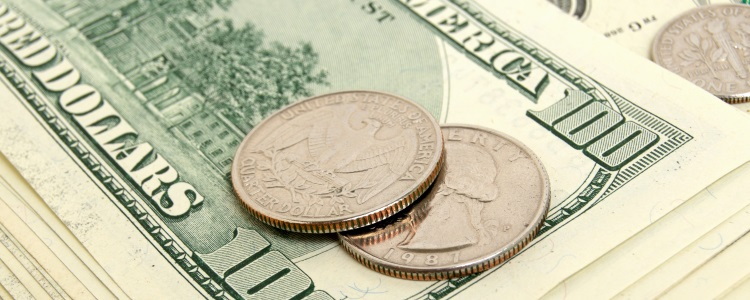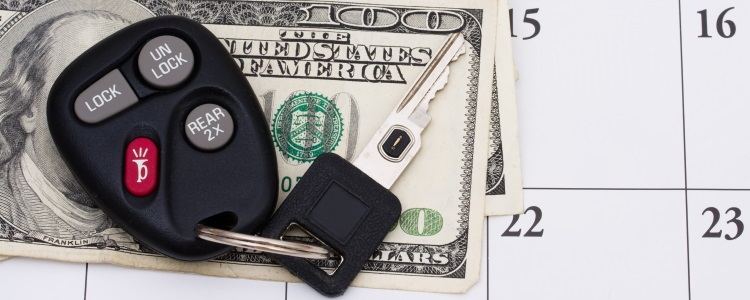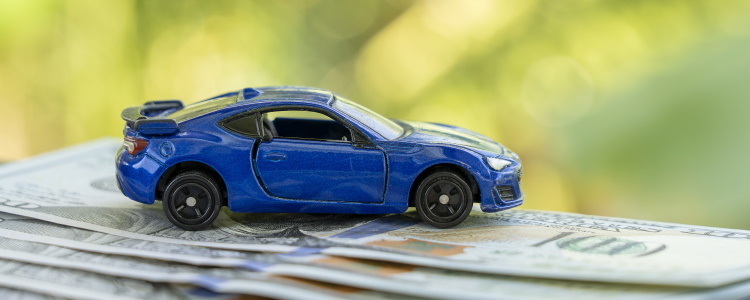Down payments absolutely lower your monthly auto loan payments! In fact, down payments are recommended for all borrowers across the credit score spectrum in most situations. Additionally, down payments have many other benefits, and if you have less than perfect credit, they can increase your chances of getting into your next car loan.
How Do Down Payments Lower Your Monthly Car Payments?
When you take on an installment loan, such as an auto loan, your total financed amount is divided into monthly payments. A typical car loan is anywhere from five to eight years long, or between 60 and 96 months.
Say you finance a vehicle for $20,000 with a 10% interest rate for 60 months. Your monthly payment would be $424.94.
When you make a down payment, that money goes right toward the total amount you need to finance. If you put 10% of the car's total negotiated selling price down, $2,000 in this case, you end up only financing for $18,000. Using the same interest rate and loan term, your monthly payment is now $382.45.
When you put money down on a loan, not only does it lower the amount you're financing, it lowers your interest charges over the course of your loan. Auto loans are (almost) always simple interest, which means you’re charged interest daily on your loan balance. When you finance less, there’s less to be charged interest on, which means keeping more money in your pocket.
How Much Should I Put Down on a Car?
 The amount you need to put down could depend on your credit situation, but personal finance experts generally recommend that you put down around 20% of the vehicle's selling price for a new car, and at least 10% for a used one.
The amount you need to put down could depend on your credit situation, but personal finance experts generally recommend that you put down around 20% of the vehicle's selling price for a new car, and at least 10% for a used one.
There are two main reasons why it’s suggested you put down more cash on the new vehicle:
- New cars are more expensive
- New cars depreciate quickly
According to Edmunds, the average price of a new vehicle clocks in at around $35,000! Since new cars come with a higher sticker price, having a short loan term with a large financed amount could mean a really large monthly payment, which can be hard to manage.
If a borrower goes for a longer loan term to offset the large monthly payment, it means more interest charges. So, a solution to battling a high monthly payment and lowering your interest charges is putting a large down payment on the vehicle’s selling price, hence the recommended 20% down.
Also, when you finance a new car, you run the risk of being in a negative equity position, which means you owe more on the vehicle than it's worth. You want to be in an equity position, where you owe less on the car than its value, since that equity can be used to put toward another vehicle purchase, or if you sell it you can pay off the loan and you can have some cash leftover.
New cars run the risk of negative equity because their value depreciates considerably in the first few years, which means you could end up paying more for the vehicle than it’s worth. Cars with negative equity can give you some trouble if you need to sell it, since you may not get enough from the sale to cover your loan balance.
While the risk of being stuck in a negative equity position is still prevalent when you finance anything, going for a used vehicle comes with a lower risk. Deprecation slows down over time, and when you get your hands on a used car that has already seen its largest drop in value, negative equity isn’t as big of an issue for used vehicle borrowers. This explains the 10% difference between new and used cars in the recommendation.
While keeping all this mind, you can still aim for however much you’d like to put down on your next vehicle. If you have a monthly payment you’d like to hit, don’t simply stretch your loan term to get to that payment; try to put down as much as you can, instead.
Down Payments vs. Long Loan Terms
Stretching your loan term as long as humanly possible seems like a great way to get to a lower monthly payment, but it can cost you.
Remember interest? The thing that gets charged daily on your loan balance? The longer you owe the auto loan, the more you’re going to pay in interest charges. This is because you’re taking a while to pay off the car, and your interest is accrued daily. Down payments can help you offset a higher than average interest rate, and pay off your loan faster.
Longer auto loan terms are becoming more commonplace, since the prices of vehicles keep rising, but it’s typically recommended that you try not to finance a car for longer than four to five years.
If you’ve got bad credit, you’re probably going to be assigned a higher interest rate than other borrowers, which means a long loan term could cost a lot over time. This is another reason why many bad credit auto lenders require down payments for you to be considered for a car loan.
Bad Credit and Down Payments
Bad credit auto lenders, also called subprime lenders, require their borrowers to make a down payment. Typically, they require at least $1,000 or 10% of the vehicle’s selling price. The down payment requirement is also partially determined by your credit score, and the car you’re looking to finance.
This is because subprime lenders first determine how much of a payment you can have each month, then you choose a vehicle that fits within that payment.
When you’re struggling with credit issues, but you need a car, it’s best to set yourself for success with your auto loan. Overextending yourself each month (or overextending your loan) could mean a higher risk of default, which won’t help your credit score.
Not only should you aim for the shortest loan term you can afford, you should also put down as much as you can to lower your monthly payment. If you’re riding on the edge of your auto loan each month, barely making that car payment, it’s going to be stressful and could lead to a default and repossession, which damages your credit even further.
Count on a bad credit lender to require a down payment for your next auto loan. Even if they don’t, it’s a great idea to save up for one anyway, since it saves you in interest charges and lowers your monthly payment. Who doesn’t like having more disposable income each month?
Ready for Your Next Car Loan?
Even when you have a down payment, a lower credit score can make finding a lender difficult, stressful, and just plain disappointing. Luckily, that’s what subprime lenders are for, and we know how to find them.
Here at Auto Credit Express, we’ve created a network of dealerships that spans coast to coast, and we know which ones work with subprime lenders. Get moving on your next car loan by filling out our free auto loan request form. We’ll look for a dealer in your area that has bad credit resources, and there’s never an obligation to buy a thing. Let’s get to work!
















